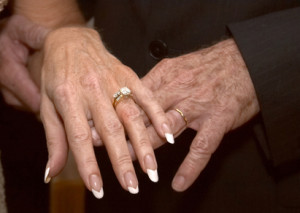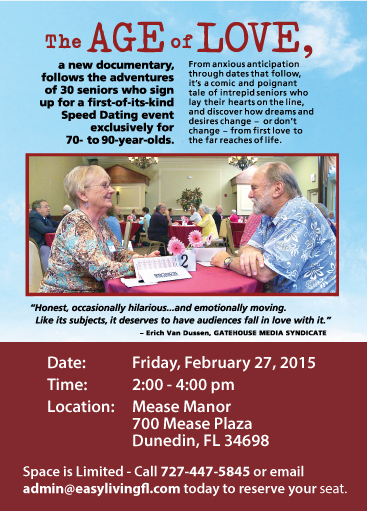Concerned About an Elderly Parent Getting Married?
What to Do When Your 85 Year Old Mother Tells You She’s Getting Married
Most of us want what’s best for our elderly parent and tend to feel a bit protective. Romantic feelings, sexuality and the need for companionship are not exclusive to youth. Many aging parents will find love again after a spouse dies (or post-divorce). For adult children, this can raise concerns, especially when the relationship happens in late life and various complexities are involved. So, our team brings you some valuable advice and resources on later life marriage.
- Take some time to process your emotions before having an in-depth conversation with your parent. You may feel upset or even angry, which can immediately cause conflict since your parent is likely feeling very happy about the situation. The way you feel is clouded by all kinds of emotions and family history. Consider taking some time to “cool off” and maybe even talk to a professional about what you’re feeling and your concerns. Our geriatric care managers can be a valuable partner in this process, helping you not only talk through things but assess legitimate concerns and find resources. For those having trouble dealing with the situation over time, counseling may be recommended.
- Prepare for a family conversation. Write down your concerns and do a little research beforehand (see our resources below). This way you can be prepared to bring concrete issues up during the conversation (and hopefully find solutions).
- Acknowledge your loved one’s emotions and consider their perspective. You should set aside quiet, non-rushed time for the meeting and include siblings and other key family members. You may want to talk to your elderly parent about having a geriatric care manager there or at a follow-up meeting (pose it as an expert to help with financial and practical questions that might come up). If your parent decides to get married , you have to decide how you will handle it and how that will effect your relationship. Even if you are not pleased with the decision (and assuming there aren’t competency issues or exploitation), it may be better to make peace after you have expressed your concrete concerns, so that you can maintain a relationship with your loved one.
Practical Concerns for an Elderly Parent Getting Married in Later Life
- Finances: This is a complicated area in most marriages but more so in later life when retirement plans, Social Security and a larger asset base often come into play. Talking to financial advisors is key (but can also be tricky when each member of the couple has a different advisor who may feel protective or have different advice…talk to them and ask if a group meeting can be set up, or what they’d advise). A good financial advisor can assist in planning to avoid pitfalls. Many advisors have gained experience in helping other clients/couples in similar situations.
- Benefits: Programs like social security and Medicaid may be affected by a marriage. Regarding Social Security (SS), remarriage after age 60 should not affect widow/widower’s benefits. If marriage occurs after full retirement age and one partner’s Social Security benefit is less than half of the new spouse’s, he/she can receive the Social Security benefit of their own record plus an additional amount to bring the amount up to half of the new spouse’s SS benefit (generally one year into the marriage)*. Medicaid is usually based on household income so this and any other public benefits may be affected.
- Estate planning: It is essential to revisit estate planning with the new marriage in mind, ideally before the marriage takes place. Wills, trusts and key legal documents as well as financial paperwork (beneficiary designations, for example) may all need to be updated (and hopefully discussed).
- Housing and logistics: Aging parents who own homes may decide to sell one home to move in together, or sell both homes and buy a new home. Adult children might have sentimental attachments to the home, or might have practical concerns (such as wanting the elders to consider selling to purchase a more senior-friendly home or move to a retirement community). Various logistical issues may arise as the partners merge their lives.
- Caregiving/long-term care needs: What if one partner has long-term care insurance and the other does not (and/or the partners have quite different financial situations)? What happens when one spouse begins to need care? How will you and your siblings feel about money being spent on care of the new spouse? Are you concerned about Mom having to take care of her new husband? *Important note: don’t mistakenly think a prenuptial agreement will solve issues of paying for care automatically. Medicaid, for example, does not acknowledge a prenup in considering the couple’s assets and income (but we recommend you talk to an elder law attorney, as there may be planning and strategies available).
Resources for an Elderly Parent Getting Married Again
Wells Fargo Conversations: Autumn Love
Five Things to Consider Before Late-in-Life Marriage*
ElderLaw Answers: How Divorce and Remarriage Affect Social Security Benefits
Contact Aging Wisely at 727-447-5845 for help with the practical and emotional issues of an elderly parent getting married. We can assist with resources and counseling, assessment of the situation and needs (as well as specific issues like memory loss and projecting possible care needs/options), family mediation and referrals to professionals such as elder law attorneys.




 Popular Downloads
Popular Downloads


 Get Our Newsletter!
Get Our Newsletter! Mission Statement
Mission Statement

